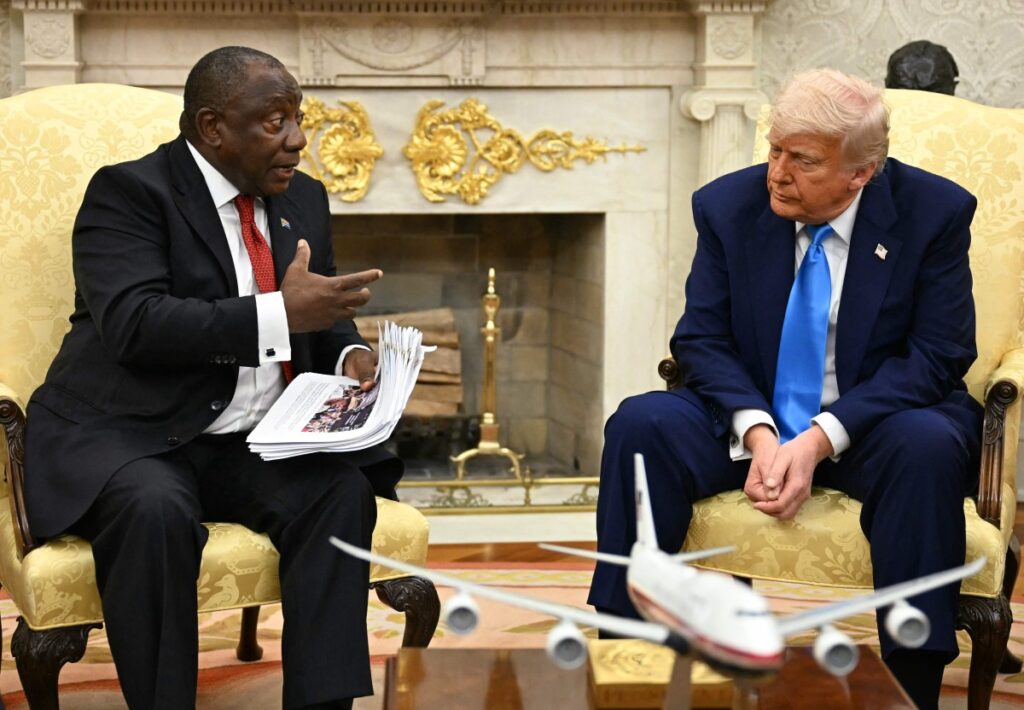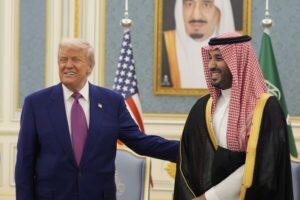
By Ambassador Ebrahim Rasool
President Cyril Ramaphosa entered Washington to meet US President Donald Trump within days of 49 other South Africans having entered. Trump’s ’asylum’ of SA’s Afrikaner ‘Refugees’, allegedly suffering ‘persecution’, was ostensibly timed to show President Ramaphosa’s delegation that they will negotiate both economic and geopolitical issues and deals on terms determined by Trump. The most notable term being that the lies about democratic South Africa’s treatment of its white community are the foundation of the USA’s relationship with South Africa.
The first group of white South African Afrikaners boarded a chartered plane for the United States. US President Donald Trump says they are the victims of ‘terrible things’ being done to them in SA:
Firstly, they allegedly face a genocide in which 4000 white farmers were killed since 2018 at a rate of 60 per day. The truth is closer to 630 tragic farm murders since 2014, according to the Transvaal Agriculture Union, with police statistics showing 32 killings in the last year. Ironically, farm killings may include black farm workers killed by those who qualify as Trump’s victims, turned refugees. But facts apparently don’t matter.
Secondly, they allegedly face massive confiscation of their land and property. The truth is that while white people are about 7% of the population, they own 72% of agricultural land, and black people who have been dispossessed of land through the 1913 Land Act and Group Areas Acts, among others, black people at best have access to 24% (inclusive of land on which even their RDP houses stand) of all land acquired patiently over 30 years of freedom without forced expropriation and often acquired at market value. But today, truth yields to power.
Thirdly, white people allegedly face DEI (diversity, equity, and inclusion) discrimination in the workplace and apparently no longer have access to professions, management, and economic ownership. The truth is that whites earn an average annual income of almost R700,000 as opposed to working Africans earning about R150,000 per year; whites occupy 66% of management positions versus blacks’ 14%; and the proportion of white-black ownership reflected in the JSE is around 70-30, with black ownership often being through institutional funds. But a nefarious agenda trumps honesty.
Pointing out facts like these in the face of persistent and deliberate lies can be deemed as ‘undiplomatic’. But how do you respond when SA is punished by the USA revoking R8 billion of aid based on that lie? This shifts the untruth to an act of power-based supremacy, to support SA’s erstwhile white supremacists who now invoke victimhood under a ‘black’ South African government. Contrast the importation of such white ‘refugees’ with the deportation of black and brown people, among others, to inhumane mega prisons in South America.
When South Africa must endure such punitive measures, including trade tariffs, what should its government do?
It must continue the fight to reverse such decisions from the USA and to retain markets as much as it can. This is what President Ramaphosa is in the USA for. But it cannot surrender to the USA nor be blackmailed by our erstwhile supremacists who threaten us with Trump every time they think their ongoing privileges are threatened with the slightest adjustments to include the real victims of apartheid. Of course, the President must explain and present the truth about the alleged treatment of white Afrikaners, and for this he even has to rope in white billionaires and golfers to offset any race-based assumption that a black president will not tell the truth, and that such truths would be more acceptable from those of Trump’s own race.
The SA delegation, however, may have to eat such humble pie to get through the door. But once in, they must play Trump’s favourite game of cards. He often assumes he is the only one with cards, and that determines the outcome of negotiations. Trump over his first 100 days has proven weaker and more vulnerable than he thought he was: his pernicious Executive Orders have frequently had to be followed by waivers; his tariff percentages had to be frequently lowered; and his trade policy has frequently had to be paused and delayed – all because reality had the last say.
The reality is that Americans pay for tariffs, not the exporter; that American stores will have empty shelves and higher prices; that counter tariffs from other countries close markets to American farmers; and that others also hold cards, sometimes more valuable than Trump’s, like China withholding critical and rare earth minerals from the USA. SA has fewer and less valuable cards than China. But it has cards like platinum, 600 US companies thriving in SA, SA companies creating jobs in the USA, and SA being the gateway for American goods into Africa. We hope President Ramaphosa will be able to play his cards – his leverages – deftly.
But the President must also assuage his people in SA on both his resolve that we negotiate interests, not values, like our case of genocide against Israel in the International Court of Justice, and our growing role in the emerging multi-polar world. The President must also crack the whip over our erstwhile apartheid supremacists so that their blackmail over transformation policy does not impede the patient justice our people seek. It is reasonable to assume that any attempt to seek redress from a foreign power, especially based on blatant untruths, and especially that results in punitive measures in aid and trade, must be repudiated and prevented.
Therefore, should we not consider that:
Firstly, whoever has assumed the notion of ‘refugee’ must be assumed to forfeit all property and assets in SA, given that refugees are down and out, and should any such possible assets not be redistributed to the real victims as identified in the TRC?
Secondly, that ‘refugees’ have no right of return to stay or visit, given that the alleged oppressive conditions are unchanged, and they have forfeited all ties of citizenship in SA in exchange for such in the USA?
Thirdly, if SA is already being punished for ‘horrible land confiscation’ without any actual and significant punitive or retributive land reform, is this not a signal to the government to actually accelerate redistribution efforts, given that, partially, that which we fear, is already materialising?
Fourthly, if we accept Trump’s argument that Afrikaners are killed at a rate of 60 per day over a decade, and this is a ‘genocide’, should he not be subpoenaed as a witness against Israel at the ICJ to testify that if 4000 tragic white deaths constitute a genocide, then certainly almost 70 000 Palestinians killed in less than 2 years, is a genocide multiplied?
Finally, should we not be disturbed that this entire episode of ‘Afrikaner Refugees’ and their expatriation constitutes an egregious interference in the politics and internal affairs of a functioning democratic and rights-oriented society?
These would constitute an interesting public debate.











